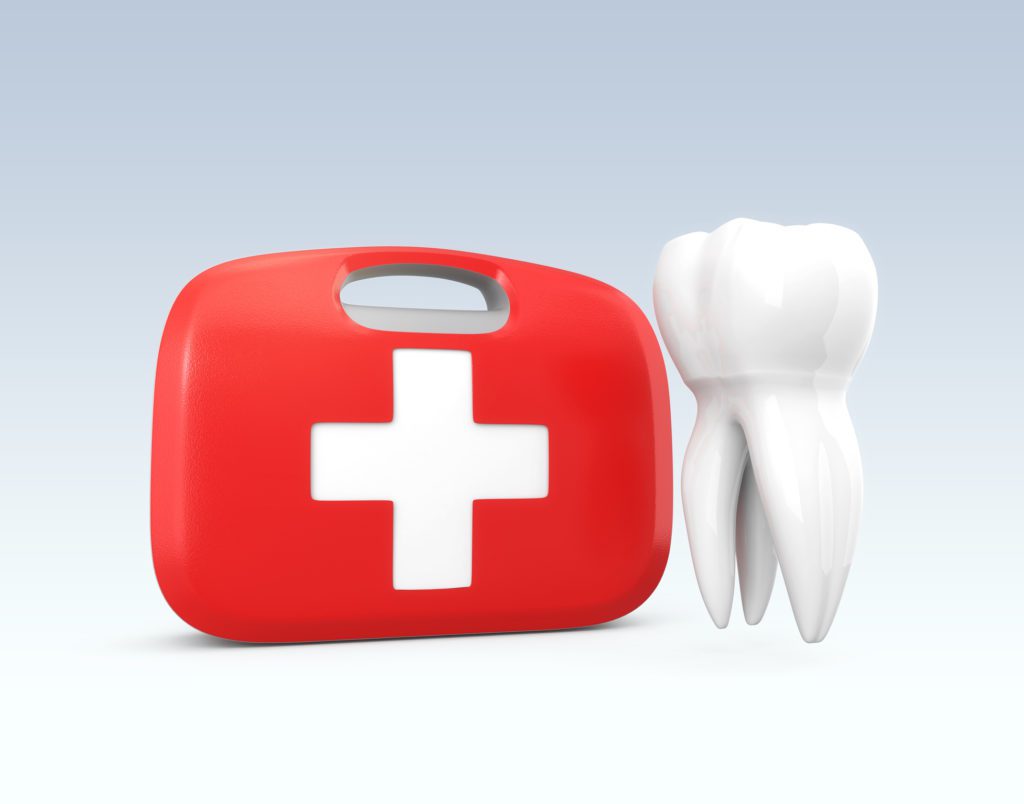If you have a dental emergency, please call The Dentists of Newtown at 267-692-2394. We are dedicated to providing patients with prompt emergency dental care in Newtown, PA. Emergency dental care is a general dentistry service that prevents immediate oral health problems from progressing.
Our professional dentists help patients keep their oral health in check at routine appointments. If you ever have any sudden or severe dental problems, please contact our office so we can provide you with high-quality treatment.

Treating Common Dental Emergencies
The most common emergencies that we see in our dental office are:
Knocked-Out Permanent Teeth
Hold it by the top or crown if you have lost a permanent tooth and can locate it. Keep the tooth in a cup of cold milk for transport to our office. We may be able to reattach teeth that a patient has kept moist. However, we suggest a dental implant if we cannot reattach the tooth. Dental implants are durable titanium posts that replace lost or missing teeth at the root. They feel and look just like natural teeth.
Tooth Pain
Severe tooth pain is often a common sign of tooth damage or decay. We may need to perform a root canal procedure, periodontal therapy, or tooth extraction. Our team provides comfortable care to alleviate tooth pain and remove a dental or gum infection.
Tooth or Gum Bleeding
Many patients may find their gums bleed after brushing and flossing. This is normal and an indicator of gum inflammation. We can easily treat gum inflammation with routine dental care. After oral surgery or tooth extraction treatment, patients may experience bleeding for several hours at the tooth socket.
We provide our patients with gauze to lessen the bleeding. However, you will require immediate care if the extraction or surgical site continues to bleed a day after treatment. If the bleeding is excessive, we recommend calling 911 before our office.
Injured Tooth
Have you just chipped or fractured a permanent tooth? Rinse your mouth with warm water, and if you are experiencing swelling, gently press a cold compress to the cheek. Our dental office offers porcelain veneers, dental bonding, and tooth crowns to add structure to injured teeth. We can color-match each option to easily blend in with your natural smile.
Broken Dental Restoration
Contact our office for immediate care if you have broken a dental crown, bridge, or denture. We will often recommend dental implants to support dental bridges and dentures. It is important to call us as soon as possible if you have a broken restoration. We want you to avoid irritation or damage to the mouth’s soft tissues.
Preventing Dental Emergencies
Dental emergencies can happen at any time, causing pain, stress, and unexpected trips to the dentist. While some accidents are unavoidable, proper care and habits can prevent many dental emergencies.
Practice Good Oral Hygiene
Maintaining good oral hygiene is one of the best ways to prevent dental emergencies. Brushing your teeth twice daily with fluoride toothpaste removes plaque and bacteria that can lead to cavities and gum disease. Flossing daily cleans areas between your teeth that a toothbrush cannot reach. Keeping your mouth clean helps prevent infections, tooth decay, and other urgent dental care problems.
Visit Your Dentist Regularly
Regular dental checkups allow us to spot early signs of tooth decay, gum disease, or other issues before they become emergencies. Professional cleanings remove plaque buildup, which can lead to cavities and infections. We may also take X-rays to check for hidden problems. You can avoid severe pain and costly treatments by catching dental issues early.
Protect Your Teeth from Injury
If you play sports or participate in activities with a risk of impact, wear a mouthguard to protect your teeth from injuries. A custom-fit mouthguard provides the best protection. If you grind your teeth at night, a nightguard can prevent damage and reduce the risk of a cracked or broken tooth.
Avoid Chewing Hard Objects
Biting down on hard objects like ice, popcorn kernels, or hard candies can crack or break your teeth. You should also avoid chewing on non-food items like pens, pencils, or fingernails. If you have a habit of using your teeth to open packages, stop immediately. Using scissors or other tools instead will help protect your teeth from damage.
Be Careful with Sticky and Sugary Foods
Sticky candies and sugary snacks can increase the risk of cavities. When sugar sits on your teeth, it feeds harmful bacteria that produce acids and wear down tooth enamel. If you do eat sweets, rinse your mouth with water afterward and brush your teeth as soon as possible.
Stay Hydrated
Drinking plenty of water throughout the day helps wash away food particles and bacteria that can lead to tooth decay and bad breath. Water also keeps your mouth moist, preventing dry mouth, which can increase the risk of cavities and gum disease.
Avoid Using Your Teeth as Tools
Many people use their teeth to tear open packages, hold objects, or even crack nuts. This habit can lead to chipped or broken teeth. Always use the right tools instead of your teeth to avoid an unnecessary dental emergency.
Handle Dental Problems Early
If you notice a toothache, sensitivity, or bleeding gums, don’t ignore it. Small issues can turn into big problems if left untreated. Contact our office at the first sign of trouble to prevent an emergency later.
Emergency Dentistry FAQs
A dental emergency needs treatment immediately. Learn more by reading the answers to these commonly asked questions.
Can I go to the emergency room for my dental emergency?
No, a licensed dentist must handle dental emergencies. Most emergency rooms in hospitals don’t have dentists on staff. If you have a problem with your soft tissue — like a cut inside your cheek — an emergency room can help with that. Anything that involves the tooth structure needs a dentist.
What do dentists consider a dental emergency?
A dental emergency is any dental problem that requires immediate treatment. It can’t wait for your next appointment and needs prompt attention. This includes sudden tooth pain, knocked-out teeth, broken teeth, or a broken dental restoration. Usually, you’ll be able to tell immediately if it’s an emergency.
What’s the most common dental emergency?
Tooth pain is the most common emergency we see. Tooth pain can stem from so many different things. It’s important to turn to a professional so that we can find the root cause of your pain and treat it appropriately. We don’t want to treat it in a way that doesn’t address the actual problem but just masks the pain.
How do I handle a dental emergency?
It may be difficult, but the most important thing is to remain calm. You don’t want to make any rash decisions in a panic. If something is broken or knocked out, gather all the pieces and bring them into our office. With bleeding, use gauze or a compress to stop the blood. Preferably, have someone trusted drive you to our office, so you don’t have to worry about that, too.
What should I do if my child’s tooth gets knocked out?
Follow the same process you would if it was an adult tooth. If a baby tooth is knocked out, we’ll perform an X-ray to see if there’s any damage to the permanent tooth under the surface. If we don’t need to replace the tooth, we can put in a spacer to avoid the teeth shifting and moving to try and fill the gap.
How do I remove a stuck object in my teeth?
It’s important to be gentle when you attempt to move the object. Try brushing your teeth or dental floss to dislodge the object first. Don’t use metal or sharp tools to remove it, as this can damage your gums or teeth. If you cannot remove the object, we may need other methods.
Schedule a Dental Appointment
If you do not have a dental emergency but require dental care, call us at 267-692-2394. Feel free to request a dental consultation with our team online. Additionally, please let us know if you have questions about your treatment options, and we will be happy to assist you.
